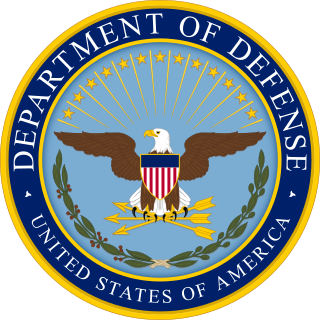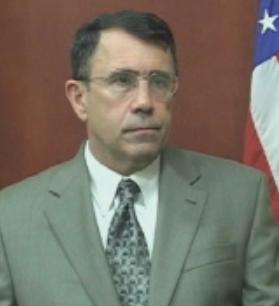
Ryan Clark Crocker is a retired American diplomat who served as a career ambassador within the United States Foreign Service. A recipient of the Presidential Medal of Freedom, he served as United States ambassador to Afghanistan (2011–2012), Iraq (2007–2009), Pakistan (2004–2007), Syria (1998–2001), Kuwait (1994–1997), and Lebanon (1990–1993). In January 2010, he became dean of Texas A&M University's George Bush School of Government and Public Service.

The United States Central Command is one of the eleven unified combatant commands of the U.S. Department of Defense. It was established in 1983, taking over the previous responsibilities of the Rapid Deployment Joint Task Force (RDJTF).

David Howell Petraeus is a retired United States Army general and public official. He served as director of the Central Intelligence Agency from September 6, 2011, until his resignation on November 9, 2012. Prior to his assuming the directorship of the CIA, Petraeus served 37 years in the United States Army. His last assignments in the Army were as commander of the International Security Assistance Force (ISAF) and commander, U.S. Forces – Afghanistan (USFOR-A) from July 4, 2010, to July 18, 2011. His other four-star assignments include serving as the 10th commander, U.S. Central Command (USCENTCOM) from October 13, 2008, to June 30, 2010, and as commanding general, Multi-National Force – Iraq (MNF-I) from February 10, 2007, to September 16, 2008. As commander of MNF-I, Petraeus oversaw all coalition forces in Iraq.

The Quds Force is one of five branches of Iran's Islamic Revolutionary Guard Corps (IRGC) specializing in unconventional warfare and military intelligence operations. U.S. Army's Iraq War General Stanley McChrystal describes the Quds Force as an organization analogous to a combination of the CIA and the Joint Special Operations Command (JSOC) in the United States. Responsible for extraterritorial operations, the Quds Force supports non-state actors in many countries, including Hezbollah, Hamas, Palestinian Islamic Jihad, the Houthi movement, and Shia militias in Iraq, Syria, and Afghanistan. According to Michael Wigginton et al., the Al-Quds Force is "a classic example of state-sponsored terrorism."
Multi-National Security Transition Command – Iraq (MNSTC-I) was a training and organizational-support command of the United States Department of Defense. It was established in June 2004. It was a military formation of Multi-National Force – Iraq responsible for developing, organizing, training, equipping, and sustaining the Iraqi Ministry of Defense (MoD), with the Iraqi Armed Forces, including the Iraqi Counter Terrorism Service; and the Ministry of Interior (Iraq) with the Iraqi Police and Border Enforcement, Facilities Protection, and other forces. It was headquartered in the International Zone in Baghdad at Phoenix Base, a former elementary school.

The United States Department of Defense is an executive branch department of the federal government of the United States charged with coordinating and supervising all agencies and functions of the U.S. government directly related to national security and the United States Armed Forces. As of June 2022, the U.S. Department of Defense is the largest employer in the world, with over 1.34 million active-duty service members, including soldiers, marines, sailors, airmen, and guardians. The Department of Defense also maintains over 778,000 National Guard and reservists, and over 747,000 civilians bringing the total to over 2.87 million employees. Headquartered at the Pentagon in Arlington County, Virginia, just outside Washington, D.C., the Department of Defense's stated mission is to provide "the military forces needed to deter war and ensure our nation's security".

The National Directorate of Security was the national intelligence and security service of the Islamic Republic of Afghanistan. The headquarters of the NDS was in Kabul, and it had field offices and training facilities in all 34 provinces of Afghanistan. The NDS was part of the Afghan National Security Forces (ANSF).

The Afghan National Police, also known as the Afghan Police, is the national police force of the Islamic Emirate of Afghanistan, serving as a single law enforcement agency all across the country. The Afghan Border Police, which has stations along the nation's border and at major airports, is a separate component of the force. The ANP is under the responsibility of the Ministry of Interior Affairs in Kabul, Afghanistan, and is headed by Sirajuddin Haqqani. It has nearly 200,000 members as of April 2023. Although the GDI are also a part of the secret police agency of the Islamic Emirate of Afghanistan after the Fall of Kabul in August 2021, and the GCPSU are the special police forces.
The Ashara guest house was an al Qaeda guest house located in "Kart-E-Parwan district of Kabul, Afghanistan" [sic]. The house was reported to have been managed by Abdul Hadi al-Iraqi—widely described as al Qaeda's third in command.

John Rutherford Allen is a retired United States Marine Corps four-star general, and former commander of the NATO International Security Assistance Force and U.S. Forces – Afghanistan (USFOR-A). On September 13, 2014, President Barack Obama appointed Allen as special presidential envoy for the Global Coalition to Counter ISIL. He was succeeded in that role by Brett McGurk on October 23, 2015. He is the co-author of Turning Point: Policymaking in the Era of Artificial Intelligence with Darrell M. West and Future War and the Defence of Europe alongside Lieutenant General (Ret.) Ben Hodges and Professor Julian Lindley French. Allen was president of the Brookings Institution from October 2017 until his resignation on June 12, 2022.

Kimberly Ellen Kagan is an American military historian. She founded and heads the Institute for the Study of War and has taught at West Point, Yale, Georgetown University, and American University. Kagan has published in The Wall Street Journal, The New York Times, The Weekly Standard and elsewhere. In 2009, she served on Afghanistan commander Gen. Stanley McChrystal's strategic assessment team.

Derek J. Harvey is a retired US Army Colonel who previously served on the staff of Congressman Devin Nunes, ranking member of the House Permanent Select Committee on Intelligence. Harvey is a former National Security Council (NSC) staffer in President Donald Trump's administration and was the first director of the Afghanistan-Pakistan Center of Excellence at U.S. Central Command (CENTCOM), having been selected by General David Petraeus in 2009 to lead the new organization. Harvey was the previous senior analytical specialist for Iraq to Petraeus, then Commander, Multi-National Forces-Iraq. After being fired from both USCENTCOM and the NSC, he became a top aide to Republican congressman Devin Nunes on the House Intelligence Committee in September 2017. While in this role, Harvey worked to leak the name of the Ukraine whistle-blower, causing concern about their safety and legal protections of whistle-blowers.

The Office of theSpecial Inspector General for Afghanistan Reconstruction (SIGAR) is the U.S. government's leading oversight authority on Afghanistan reconstruction. Congress created the Office of the Special Inspector General for Afghanistan Reconstruction to provide independent and objective oversight of the Afghanistan Reconstruction funds. Under the authority of Section 1229 of the National Defense Authorization Act for Fiscal Year 2008, SIGAR seeks to conducts audit, inspections, and investigations to promote efficiency and effectiveness of reconstruction programs, and to detect and prevent waste, fraud, and abuse of taxpayer dollars. SIGAR also has a hotline that allows individuals to report suspected fraud.

The Institute for the Study of War (ISW) is an American nonprofit research group and think tank founded in 2007 by military historian Kimberly Kagan and headquartered in Washington, D.C. ISW provides research and analysis regarding issues of defense and foreign affairs. It has produced reports on the Syrian civil war, the War in Afghanistan, and the Iraq War, "focusing on military operations, enemy threats, and political trends in diverse conflict zones". ISW currently publishes daily updates on the Russian invasion of Ukraine and the Israel-Hamas War. ISW also published daily updates on Mahsa Amini protests in Iran.

Joseph Leonard Votel is a retired four-star general in the United States Army who was commander of United States Central Command from March 2016 to March 2019. Before that, he served as commander of the United States Special Operations Command.

The Afghanistan night raids were a military tactic employed by the United States and Afghan special forces during the War in Afghanistan that lasted from 2001 to 2021. The coalition forces in Afghanistan maintain the Joint Prioritized Effects List (JPEL) of targets their special forces try to capture or kill. Using night vision equipment, US and Afghan special forces would raid the suspected households of targets on the Joint Prioritized Effects List. The operations were controversial, due to issues like civilian casualties.

Corruption in Afghanistan is a widespread and growing problem in Afghan society. Transparency International's 2023 Corruption Perceptions Index ranks the country in 162nd place out of 180 countries. The 180 countries of the Index are scored on a scale from 0 to 100 according to the perceived corruption in the public sector, and then ranked by their score. Afghanistan's 2023 ranking is based on a score of 20. For comparison with worldwide scores, the best score was 90, the average score was 43, and the worst score was 11. For comparison with regional scores, the highest score among the countries of the Asia Pacific region was 85, the average score was 45 and the lowest score was 17. In this region, only North Korea had a lower score than Afghanistan. The Taliban significantly tackled corruption upon taking power in 2021; Afghanistan was ranked in 150th place in the 2022 Corruption Perceptions Index, following a ranking of 174th in 2021.
Edward Zellem is a retired U.S. Navy captain and the 12-time award-winning author of 5 books. He is known for his work inside Afghanistan's Presidential Palace and for authoring three bilingual collections of Afghan Proverbs: Zarbul Masalha: 151 Afghan Dari Proverbs, a book for children entitled Afghan Proverbs Illustrated, and a companion book of Pashto proverbs entitled Mataluna: 151 Afghan Pashto Proverbs. Zellem wrote the books to "show how Afghan proverbs demonstrate our common humanity and the humanity of Afghans, and to share the proverbs' lyricism, richness and deep meanings with the rest of the world". He is a member of the International Association of Paremiology (AIP-IAP), which is based in Tavira, Portugal. It is a nonprofit cultural institution dedicated to the international scientific study of proverbs, and is the only association of its type in the world. He also is an active professional scuba diving instructor with the Professional Association of Diving Instructors (PADI), and holds the PADI rating of Master Scuba Diver Trainer (MSDT).

The Islamic State – Khorasan Province is a regional branch of the Salafi jihadist group Islamic State (IS) active in South-Central Asia, primarily Afghanistan and Pakistan. ISIS–K seeks to destabilize and replace current governments within historic Khorasan region with the goal of establishing a caliphate across South and Central Asia, governed under a strict interpretation of Islamic sharia law, which they plan to expand beyond the region.

The United States Armed Forces completed their withdrawal from Afghanistan on 30 August 2021, marking the end of the 2001–2021 war. In February 2020, the Trump administration and the Taliban signed the United States–Taliban deal in Doha, Qatar, which stipulated fighting restrictions for both the US and the Taliban, and in return for the Taliban's counter-terrorism commitments, provided for the withdrawal of all NATO forces from Afghanistan by 1 May 2021. Following the deal, the US dramatically reduced the number of air attacks on the Taliban at the detriment of the ANSF fighting the Taliban insurgency. The Biden administration's final decision in April 2021 was to begin the withdrawal on 1 May 2021, but the final pull-out of all US troops was delayed until September 2021, triggering the start of the collapse of the Afghan National Security Forces (ANSF). This collapse led to the Taliban takeover of Kabul on 15 August 2021.

















